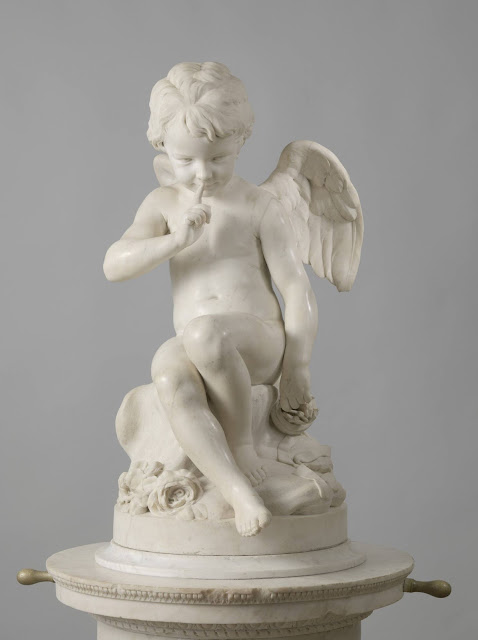 |
| Jean Goujon Venus and Cupid 1540s marble relief Hermitage, Saint Petersburg |
 |
| Christophe Veyrier Bust portrait of Admiral Jean Gabaret 1660s marble Louvre |
"Those who are well born ordinarily have good inclinations, which others only rarely have, and it seems that they come naturally to those of good birth, whereas it is only by accident that they are found in others."
– Nicolas Faret, 1634, quoted in Becoming a French Aristocrat by Mark Motley, Princeton University Press, 1990
 |
| Nicolas Cordier Zingarella 1607-12 colored marbles, bronze Galleria Borghese, Rome |
 |
| Jean-Louis Lemoyne Bust portrait of Jules Hardouin-Mansart 1703 marble Louvre |
"At school the lessons the nobility receive are of no use for their education, and overburden their memories to no purpose for the rest of their lives."
– Nicolas Le Gras, 17th century, quoted in Becoming a French Aristocrat by Mark Motley, Princeton University Press, 1990
 |
| Pierre Puget Perseus and Andromeda 1678-84 marble Louvre |
 |
| Étienne Maurice Falconet L'amour menaçant (originally owned by Madame de Pompadour) 1757 marble Rijksmuseum, Amsterdam |
"Here's a man [Étienne Maurice Falconet] who has genius and all kinds of character traits compatible and incompatible with genius, though these last are also to be found in Francois de Verulam and Pierre Corneille. This is because he has finesse, taste, intelligence, delicacy, kindness, and grace in full measure; because he's awkward and polite, friendly and brusque, kind and harsh; because he works in clay and marble, and reads and reflects; because he's a philosophe, believing in nothing and knowing perfectly well why not. Because he's a good father whose son fled his household; because he was madly in love with his mistress yet made her die of anguish, because this made him sad, somber, melancholy, because he almost perished from sorrow, and because, though she died some time ago, he still hasn't recovered from the loss of her. Add that no man is more desirous of the praise of his contemporaries and more indifferent to that of posterity. He carries this view to an unbelievable extreme, and has told me a hundred times he wouldn't give a penny to guarantee the eternity of his most beautiful statue."
- Denis Diderot, from the Salon of 1765, translated by John Goodman, Yale University Press, 1995
 |
| Antoine Coysevox Bust portrait of Marie Serre 1706 marble Louvre |
 |
| Clodion Pan pursuing Syrinx ca. 1770 marble relief Louvre |
 |
| Clodion Vase carved in high relief 1770s marble Wallace Collection, London |
 |
| Augustin Pajou Psyche Abandoned 1790 marble Louvre |
 |
| Augustin Pajou Bust portrait of Mme du Barry 1773 marble Louvre |
"Above his door Pajou has had inscribed, as his device, the maxim of Petit-Jean: "Without money, without money, honor is but a sickness." I admire nothing he showed this year. I examined the long row of his busts searching for something I might praise, but in vain. Such is the result of running after lucre. ... He's only done one good thing since his return from Rome. He's a talent crushed beneath a sack of gold; may he stay there."
– Denis Diderot, from the Salon of 1767, translated by John Goodman, Yale University Press, 1995
 |
| Antoine Denis Chaudet Cupid presenting a Rose to a Butterfly 1802 marble Louvre |
 |
| François Joseph Bosio Aristaeus, God of the Gardens 1817 marble Louvre |
 |
| Jean-Baptiste Carpeaux Ugolino and his Sons marble 1865-67 Metropolitan Museum of Art, New York |
"In a revealing biography recounting Philippe de Strozzi's childhood in mid-sixteenth-century France we learn that his father "in order to give his son assurance, and increase his courage, on occasion drew his sword and held it an inch from his face or stomach, asking him if he wasn't afraid." When he asked his father for a collar rather than a horse, a sword, or something else of a soldier, his father replied, "since he preferred a chain, he would be sent to the galleys ... and placed in chains there." Moreover, his father tested his courage at night, provoking him with the observation that "you won't be so brave and assured" alone at night. And so he came at night to frighten the boy, "knocking on his door, and disguising his voice in a horrible manner," until his son struck him on the forehead with a well-aimed key. At this point he left the boy in peace, "swearing to never again frighten him in this way at night."
– Mark Motley, from Becoming a French Aristocrat, Princeton University Press, 1990